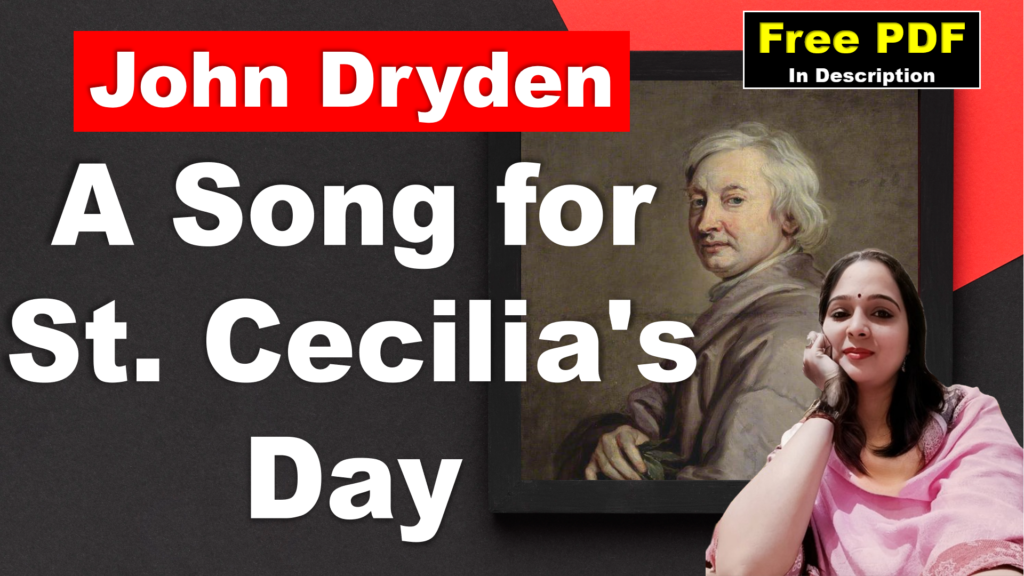
Word Meaning
| Line | Word | Meaning | Meaning in Hindi |
| Stanza 1 | |||
| 1 | harmony | agreement in feeling | सद्भाव |
| 1 | Heav’nly | of or relating to heaven | दिव्य |
| 2 | universal frame | the entire universe | सार्वभौमिक ढांचा |
| 3 | underneath | below | नीचे |
| 3 | heap | mass | ढेर |
| 4 | Jarring atoms | clashing or conflicting atoms | झगड़ते हुए परमाणु |
| 4 | lay | keep | बिछाना |
| 5 | heave | to lift | ऊपर उठाना |
| 9 | leap | jump | छलाँग |
| 10 | obey | To comply | आज्ञा का पालन करना |
| 14 | notes | Tone | सुर |
| 15 | diapason | The entire compass of tones | स्वरों का संपूर्ण कम्पास |
| 1 | passion | strong feelings of love, anger, or excitement | जुनून |
| 1 | quell | to put an end to or subdue | शांत करना |
| 2 | Jubal | the biblical inventor of music | संगीत के बाइबिल आविष्कारक |
| 2 | corded shell | a type of shell with a spiral shape and a series of ridges on it | तार वाला शंख |
| 3 | list’ning brethren | listening brothers | सुनने वाले भाई |
| 5 | celestial sound | a sound that is heavenly or divine | दिव्य ध्वनि |
| 6 | dwell | settle | बसना |
| 7 | shell | casing | शंख |
| Stanza 3 | |||
| 1 | trumpet | horn | तुरही |
| 1 | loud clangor | the loud and harsh sound | तेज आवाज |
| 3 | shrill | piercing | तीखे |
| 4 | mortal alarms | great fear or worry | नश्वर चेतावनी। |
| 6 | thund’ring | a loud and rumbling sound | गरजते हुए |
| 7 | hark | hear | सुनना |
| 7 | foes | enemy | दुश्मनों |
| 8 | Charge | raid | धावा |
| 8 | retreat | retrograde | पीछे हटना |
| Stanza 4 | |||
| 1 | soft complaining flute | a flute that makes a soft and gentle sound | एक बांसुरी जो मधुर और कोमल ध्वनि उत्पन्न करती है |
| 2 | Dying notes | notes that are fading away | लुप्त होते सुर |
| 3 | woes | unhappiness | दुख |
| 4 | dirge | a song of mourning | शोक गीत |
| 4 | warbling lute | a lute that makes a gentle and melodious sound | युद्धरत वीणा |
| Stanza 5 | |||
| 1 | sharp violins | violins that make a sharp and piercing sound | तीखे वायलिन |
| 1 | proclaim | announce or declare loudly and publicly | घोषित करना |
| 2 | jealous pangs | sudden feelings of jealousy | ईर्ष्यालु पीड़ा |
| 2 | desperation | a feeling of complete hopelessness | हताशा |
| 3 | Fury | rage | रोष |
| 3 | frantic indignation | extreme anger and resentment | उन्मत्त आक्रोश |
| 5 | disdainful | contemptuous | तिरस्कारपूर्ण |
| 5 | dame | woman | महिला |
| Stanza 6 | |||
| 3 | sacred | holy | पवित्र |
| 4 | holy love | Pure love | पवित्र प्रेम |
| 6 | mend | improve | ठीक करना |
| 6 | choirs | singing | गायन |
| Stanza 7 | |||
| 1 | Orpheus | a great musician | एक महान संगीतकार |
| 1 | savage | uncivilized and violent | जंगली |
| 3 | Sequacious | follower | अनुगामी |
| 3 | lyre | a type of stringed instrument | वीणा |
| Grand Chorus | |||
| 1 | sacred lays | Holy song | पवित्र गीत |
| 2 | spheres | the planets | ग्रहों |
| 5 | dreadful | terrible | भयानक |
| 6 | crumbling | shred | ढहती |
| 6 | pageant | A passion show | तमाशा |
| 6 | devour | destroy | नष्ट करना |
| 7 | trumpet | horn | तुरही |
| 9 | untune | discompose | बेसुरा करना |
A Song for St Cecilia’s Day Summary
The poem “A Song for St. Cecilia’s Day, 1687” by John Dryden is a celebration of the power of music. Dryden argues that music is not just a pleasant sound; it is a force that can create order and beauty out of chaos, move and inspire people, and even connect people to the divine.
The poem begins with the speaker asserting that the universe itself was created through the power of music. He then describes how music can move and inspire people, and how it can even be used to control people’s emotions. The speaker also discusses the power of music to express different human emotions, from love and joy to grief and anger.
In the sixth stanza, the speaker praises the power of the organ to inspire religious awe. He then compares Saint Cecilia, the patron saint of music, to Orpheus, a legendary Greek musician who was able to charm all living things with his music. The speaker suggests that Saint Cecilia’s music was even more powerful than Orpheus’, and that it was so powerful that it could even attract the attention of angels.
The poem concludes with a grand chorus that celebrates the power of music to create and destroy. The speaker suggests that music will play a role in both the creation and the destruction of the universe.
Overall, the poem ” A Song for St. Cecilia’s Day, 1687″ is a powerful and evocative meditation on the power of music. Dryden uses vivid imagery and rhetorical devices to convey the sense of grandeur, awe, and terror that is associated with the power of music.
Key Points
Author: The poem was written by John Dryden, an important English poet who dominated the literary scene of his day so much that it came to be known as the Age of Dryden.
Background: The poem was written to celebrate St. Cecilia’s Day on November 22, 1687. St. Cecilia is the patron saint of music.
Theme: The central theme of “A Song for St. Cecilia’s Day” is the power and beauty of music. It suggests that music is not just entertainment but a divine gift that can move and inspire us.
Structure and Rhyme Scheme: The poem is divided into eight sections or stanzas. The first seven stanzas are sung by a single voice, while the last stanza is meant for a grand chorus. The rhyme scheme varies throughout the poem to suit its structure and content. Each stanza has its own distinct pattern.
Conclusion: The poem concludes with a grand chorus that celebrates St. Cecilia’s divine music. It suggests that her music has such power that it could even cause heaven to shake.





